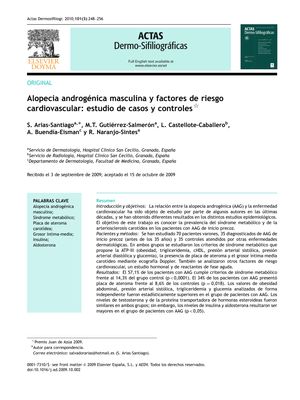Male Androgenetic Alopecia and Cardiovascular Risk Factors: A Case-Control Study
March 2010
in “
Actas Dermo-Sifiliográficas
”
androgenetic alopecia metabolic syndrome carotid arteriosclerosis abdominal obesity systolic blood pressure triglycerides blood glucose insulin aldosterone testosterone sex hormone-binding globulin carotid atheromatous plaques inflammation markers fibrinogen erythrocyte sedimentation rate AGA high blood pressure blood sugar SHBG carotid plaques ESR

TLDR Men with early-onset baldness have a higher chance of heart disease and clogged arteries.
The study from 2010 examined 35 men with early-onset androgenetic alopecia (AGA) and compared them to 35 control subjects to assess the prevalence of metabolic syndrome and carotid arteriosclerosis. It found that 57.1% of AGA patients met the criteria for metabolic syndrome, which was significantly higher than the 14.3% in the control group. Additionally, 34% of AGA patients had carotid atheromatous plaques compared to 8.6% of controls. The study also noted that AGA patients had higher levels of abdominal obesity, systolic blood pressure, triglycerides, blood glucose, insulin, and aldosterone, but similar testosterone and sex hormone-binding globulin levels compared to controls. Furthermore, 20% of AGA patients had unilateral carotid atheroma plaque, and 14.3% had bilateral plaques. Elevated inflammation markers such as fibrinogen and erythrocyte sedimentation rate were also observed in AGA patients. The study concluded that male AGA is associated with a higher prevalence of cardiovascular risk factors and carotid atheromatosis, suggesting the need for cardiovascular screening in these patients.










